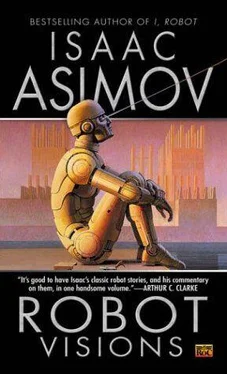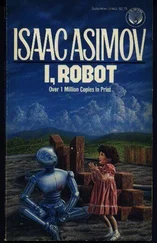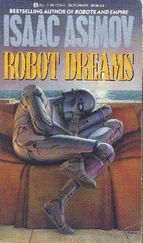Isaac Asimov - Robot Visions
Здесь есть возможность читать онлайн «Isaac Asimov - Robot Visions» весь текст электронной книги совершенно бесплатно (целиком полную версию без сокращений). В некоторых случаях можно слушать аудио, скачать через торрент в формате fb2 и присутствует краткое содержание. Жанр: Фантастика и фэнтези, на английском языке. Описание произведения, (предисловие) а так же отзывы посетителей доступны на портале библиотеки ЛибКат.
- Название:Robot Visions
- Автор:
- Жанр:
- Год:неизвестен
- ISBN:нет данных
- Рейтинг книги:5 / 5. Голосов: 1
-
Избранное:Добавить в избранное
- Отзывы:
-
Ваша оценка:
- 100
- 1
- 2
- 3
- 4
- 5
Robot Visions: краткое содержание, описание и аннотация
Предлагаем к чтению аннотацию, описание, краткое содержание или предисловие (зависит от того, что написал сам автор книги «Robot Visions»). Если вы не нашли необходимую информацию о книге — напишите в комментариях, мы постараемся отыскать её.
Robot Visions — читать онлайн бесплатно полную книгу (весь текст) целиком
Ниже представлен текст книги, разбитый по страницам. Система сохранения места последней прочитанной страницы, позволяет с удобством читать онлайн бесплатно книгу «Robot Visions», без необходимости каждый раз заново искать на чём Вы остановились. Поставьте закладку, и сможете в любой момент перейти на страницу, на которой закончили чтение.
Интервал:
Закладка:
“Good-by,” said Byerley imperturbably, to the blank plate.
Byerley brought his “teacher” back the week before election. The air car dropped quickly in an obscure part of the city.
“You’ll stay here till after election,” Byerley told him. “It would be better to have you out of the way if things take a bad turn.”
The hoarse voice that twisted painfully out of John’s crooked mouth might have had accents of concern in it. “There’s danger of violence?”
“The Fundamentalists threaten it, so I suppose there is, in a theoretical sense. But I really don’t expect it. The Fundies have no real power. They’re just the continuous irritant factor that might stir up a riot after a while. You don’t mind staying here? Please, I won’t be myself if I have to worry about you.”
“Oh, I’ll stay. You still think it will go well?”
“I’m sure of it. No one bothered you at the place?”
“No one. I’m certain.”
“And your part went well?”
“Well enough. There’ll be no trouble there.”
“Then take care of yourself, and watch the televisor tomorrow, John.” Byerley pressed the gnarled hand that rested on his.
Lenton’s forehead was a furrowed study in suspense. He had the completely unenviable job of being Byerley’s campaign manager in a campaign that wasn’t a campaign, for a person that refused to reveal his strategy, and refused to accept his manager’s.
“You can’t!” It was his favorite phrase. It had become his only phrase. “I tell you, Steve, you can’t!”
He threw himself in front of the prosecutor, who was spending his time leafing through the typed pages of his speech.
“Put that down, Steve. Look, that mob has been organized by the Fundies. You won’t get a hearing. You’ll be stoned more likely. Why do you have to make a speech before an audience? What’s wrong with a recording, a visual recording?”
“You want me to win the election, don’t you?” asked Byerley, mildly.
“Win the election! You’re not going to win, Steve. I’m trying to save your life.”
“Oh, I’m not in danger.”
“He’s not in danger. He’s not in danger.” Lenton made a queer, rasping sound in his throat. “You mean you’re getting out on that balcony in front of fifty thousand crazy crackpots and try to talk sense to them – on a balcony like a medieval dictator?”
Byerley consulted his watch. “In about five minutes – as soon as the televisor lines are free.”
Lenton’s answering remark was not quite transliterable.
The crowd filled a roped off area of the city. Trees and houses seemed to grow out of a mass-human foundation. And by ultra-wave, the rest of the world watched. It was a purely local election, but it had a world audience just the same. Byerley thought of that and smiled.
But there was nothing to smile at in the crowd itself. There were banners and streamers, ringing every possible change on his supposed roboticity. The hostile attitude rose thickly and tangibly into the atmosphere.
From the start the speech was not successful. It competed against the inchoate mob howl and the rhythmic cries of the Fundie claques that formed mob-islands within the mob. Byerley spoke on, slowly, unemotionally-
Inside, Lenton clutched his hair and groaned – and waited for the blood.
There was a writhing in the front ranks. An angular citizen with popping eyes, and clothes too short for the lank length of his limbs, was pulling to the fore. A policeman dived after him, making slow, struggling passage. Byerley waved the latter off, angrily.
The thin man was directly under the balcony. His words tore unheard against the roar.
Byerley leaned forward. “What do you say? If you have a legitimate question, I’ll answer it.” He turned to a flanking guard. “Bring that man up here.”
There was a tensing in the crowd. Cries of “Quiet” started in various parts of the mob, and rose to a bedlam, then toned down raggedly. The thin man, red-faced and panting, faced Byerley.
Byerley said, “Have you a question?”
The thin man stared, and said in a cracked voice, “Hit me!”
With sudden energy, he thrust out his chin at an angle. “Hit me! You say you’re not a robot. Prove it. You can’t hit a human, you monster.”
There was a queer, flat, dead silence. Byerley’s voice punctured it. “I have no reason to hit you.”
The thin man was laughing wildly. “You can’t hit me. You won’t hit me. You’re not a human. You’re a monster, a make-believe man.”
And Stephen Byerley, tight-lipped, in the face of thousands who watched in person and the millions, who watched by screen, drew back his fist and caught the man crackingly upon the chin. The challenger went over backwards in sudden collapse, with nothing on his face but blank, blank surprise.
Byerley said, “I’m sorry. Take him in and see that he’s comfortable. I want to speak to him when I’m through.”
And when Dr. Calvin, from her reserved space, turned her automobile and drove off, only one reporter had recovered sufficiently from the shock to race after her, and shout an unheard question.
Susan Calvin called over her shoulder, “He’s human.”
That was enough. The reporter raced away in his own direction.
The rest of the speech might be described as “Spoken but not heard.”
Dr. Calvin and Stephen Byerley met once again – a week before he took the oath of office as mayor. It was late – past midnight.
Dr. Calvin said, “You don’t look tired.”
The mayor-elect smiled. “I may stay up for a while. Don’t tell Quinn.”
“I shan’t. But that was an interesting story of Quinn’s, since you mention him. It’s a shame to have spoiled it. I suppose you knew his theory?”
“Parts of it.”
“It was highly dramatic. Stephen Byerley was a young lawyer, a powerful speaker, a great idealist – and with a certain flare for biophysics. Are you interested in robotics, Mr. Byerley?”
“Only in the legal aspects.”
“This Stephen Byerley was. But there was an accident. Byerley’s wife died, he himself, worse. His legs were gone; his face was gone; his voice was gone. Part of his mind was bent. He would not submit to plastic surgery. He retired from the world, legal career gone – only his intelligence, and his hands left. Somehow he could obtain positronic brains, even a complex one, one which had the greatest capacity of forming judgments in ethical problems – which is the highest robotic function so far developed.
“He grew a body about it. Trained it to be everything he would have been and was no longer. He sent it out into the world as Stephen Byerley, remaining behind himself as the old, crippled teacher that no one ever saw-”
“Unfortunately,” said the mayor-elect, “I ruined all that by hitting a man. The papers say it was your official verdict on the occasion that I was human.”
“How did that happen? Do you mind telling me? It couldn’t have been accidental.”
“It wasn’t entirely. Quinn did most of the work. My men started quietly spreading the fact that I had never hit a man; that I was unable to hit a man; that to fail to do so under provocation would be sure proof that I was a robot. So I arranged for a silly speech in public, with all sorts of publicity overtones, and almost inevitably, some fool fell for it. In its essence, it was what I call a shyster trick. One in which the artificial atmosphere which has been created does all the work. Of course, the emotional effects made my election certain, as intended.”
The robopsychologist nodded. “I see you intrude on my field – as every politician must, I suppose. But I’m very sorry it turned out this way. I like robots. I like them considerably better than I do human beings. If a robot can be created capable of being a civil executive, I think he’d make the best one possible. By the Laws of Robotics, he’d be incapable of harming humans, incapable of tyranny, of corruption, of stupidity, of prejudice. And after he had served a decent term, he would leave, even though he were immortal, because it would be impossible for him to hurt humans by letting them know that a robot had ruled them. It would be most ideal.”
Читать дальшеИнтервал:
Закладка:
Похожие книги на «Robot Visions»
Представляем Вашему вниманию похожие книги на «Robot Visions» списком для выбора. Мы отобрали схожую по названию и смыслу литературу в надежде предоставить читателям больше вариантов отыскать новые, интересные, ещё непрочитанные произведения.
Обсуждение, отзывы о книге «Robot Visions» и просто собственные мнения читателей. Оставьте ваши комментарии, напишите, что Вы думаете о произведении, его смысле или главных героях. Укажите что конкретно понравилось, а что нет, и почему Вы так считаете.








